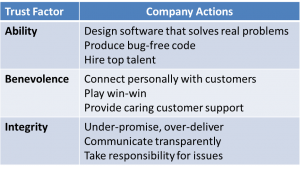 In the subscription economy, the level of trust companies accumulate with customers is a primary driver of retention and loyalty. But what is trust and what should cloud computing executives be mindful of in their day-to-day operations?
In the subscription economy, the level of trust companies accumulate with customers is a primary driver of retention and loyalty. But what is trust and what should cloud computing executives be mindful of in their day-to-day operations?
This business of trust
Research indicates three main factors impact loyalty. First, customer retention begins when companies deliver high quality, valuable products. Satisfied customers aren’t always loyal, but loyal customers are almost always satisfied. The relative cost of switching to another provider is the second ingredient. When barriers to change are high, people are naturally less likely to defect. But an equally influential third driver, relationship strength—and trust in particular—has also been shown to moderate customer loyalty.[1] The evidence is clear and compelling. The more people know, like and trust a supplier, the more they repurchase, consider new products, and refer business to friends and family.
So what is trust? A common definition:
A willingness to accept vulnerability or risk based on expectations regarding another person’s behavior[2]
We humans are naturally suspicious. From an evolutionary perspective it’s safer to be wary of another’s intentions. Our social defense mechanism served us well for millennia—ascertaining friend or foe quickly and accurately made the difference in life and death situations. In today’s society, our reticence impacts how we deal with unknown brands. We must become confident in our appraisals before we place our trust in a person, company, or technology. Only then do we risk investing our time, money and effort in anticipation of future returns.
The aspects scientists most often associate with trust are:
- Ability—Competence, predictability and consistency in behavior
- Benevolence—Caring, goodwill, empathy and commitment to shared goals
- Integrity—Fairness, objectivity, honesty and open communication
Whether we’re conscious of it or not, we weigh these attributes when we must decide on whom to trust. Take your doctor, for example. If she is a skilled healer, cares about you, and shoots straight when it comes to sharing the news, you probably trust her. The same is true when selecting a contractor. Does he do good work? Will he listen to me and do the job the way I want? Will his prices be fair? We evaluate trust from our firsthand experience, and if someone is new to us, we rely heavily on first impressions and input from other trusted sources.
A foundation of trust
Cloud computing executives should think about trust in the same way. Leaders probably expect customers to be initially suspicious of salespeople’s claims and that prospects will do their homework before committing to a contract. But executives should also realize that trust is built through cumulative experience. How well the organization lived up to its promises after the sale becomes the customer’s primary source of information.
So what corporate actions demonstrate trustworthiness? Perhaps it’s obvious:
Companies must retain customers for longer periods in order to be profitable in subscription businesses, so high trust becomes the very foundation of company sustainability. There’s just no faking it. The pressure to continuously deliver quality and value, foster strong customer relationships, and stay one step ahead of the competition means recurring revenue businesses never rest. Everyone in the organization must continually contribute to maintaining the customer’s sacred trust. And the person in the corner office must ensure all employees live up to this core value every day.
Learning to trust
Executives must also recognize that people learn to trust. it’s a process that’s repeated with each and every new customer. While customers may interact with the company hundreds or even thousands of times during their subscription periods, research says five moments in particular make all the difference. Leaders who properly and systematically orchestrate trusting experiences within the context of learning ensure customers consistently and rapidly acquire trust in the company’s brand.
Given a rich and satisfying history with a software brand, customers are almost always willing to accept the inherent risk of another software subscription term. And when companies continually demonstrate their ability to solve problems, hire and train benevolent personnel, and run their businesses with integrity, they earn their customers’ trust and secure their future business.
Did you enjoy this article? Subscribe to Excel-lens now and never miss another post.
Sources:
[1] Ruyter, K., Moorman, L., and Lemmink, J. (2001) Antecedents of Commitment and Trust in Customer–Supplier
Relationships in High Technology Markets. Industrial Marketing Management 30, 271–286 (2001)
[2] Borum, R. (2010) Science of Interpersonal Trust. SelectedWorks of Randy Borum, University of South Florida

